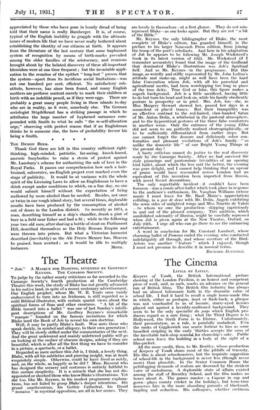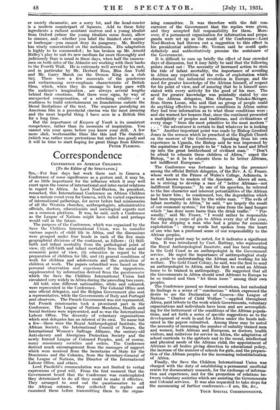The Cinema
Lirrix BY Lirrix.
Keepers of Youth, the British International picture showing at the London Pavilion, is an honest and competent piece of work, and, as such, marks an advance on the general run of British films. The British film industry has always had an almost talismanic faith in the dramatic value of school life. I find it hard to recall a single home-made film in which, either as prologue, inset or flash-back, a glimpse was not vouchsafed to us of laconic, starry-eyed heroics played out against a lavishly-mullioned background. They seem to be the only specialite du pays which English pro- ducers regard as a sure thing ; what the Third Degree is to Hollywood, the Sixth Form is to Elstree. Unfortunately, their presentation, as a rule, is painfully maladroit. E'en the ranks of Giggleswick can scarce forbear to hiss as some tasselled stripling in the early 'thirties accepts the onus of the inevitable tuck-shop scandal for chumship's sake. Public school men leave the building in a body at the bight of a film-prefect. All the more credit, then, to Mr. Bentley, whose production of Keepers of Youth shuns most of the pitfalls of travesty. His film is about schoolmasters, but the requisite suggestion of school-life in the background is never less (though never more) than plausible. In the Senior Common Room the pettifogging demands of realism are drowned by the strident voice of melodrama. A deplorable state of affairs existed among the staff of Brentley School, and the film makes no bones about it. The games master—a Capone in cap and gown—plays county cricket in the holidays, but term-time immerses him in the more absorbing pursuits of blackmail, tippling and seduction. His colleagues, whether cretinous
or merely rheumatic, are a sorry lot, and the head-master is a modem counterpart of Squeers. Add to these fishy ingredients a radiant assistant matron and a young idealist from Oxford (where the young idealists come from), allow to simmer, and—whether you label the finished stew expose' or burlesque—you cannot deny its pungency. Mr. Bentley has wisely concentrated on the melodrama. His adaptation is highly to be commended ; he has broken up Mr. Arnold Ridley's play to suit its new medium far more thoroughly and judiciously than is usual in these days, when half the camera- men on both sides of the Atlantic are working with their backs to the Fourth Wall. He is extremely well served by his cast, and in particular by Mr. Herbert Ross, Miss Ann Todd and Mr. Garry Marsh (as the Demon King in a club tie). There were a few moments of the ponderous and embarrassing over-emphasis characteristic of British films, which, when they do manage to keep pace with the audience's imagination, are always several lengths behind their emotions. But there were signs, by way of unexpected compensation, of a refreshing vitality—of a readiness to build entertainment on foundations outside the literal limitations of the text. The sequence parodying an American film in a provincial cinema was the most amusing and the most hopeful thing I have seen in a British ffiro for a long time.
But the importance of Keepers of Youth is its consistent Competence, rather than its moments of inspiration. You cannot win your spurs before you know your drill. A few more slick, workmanlike films like this and The Outsider, (which was rather more pretentious but rather less good) and it will be time to start hoping for great things from Elstree.
PETER FLEMING.



































 Previous page
Previous page